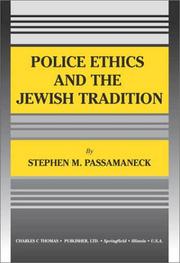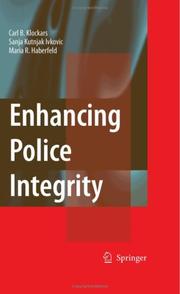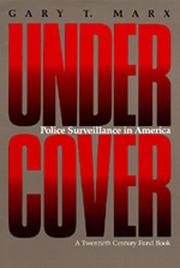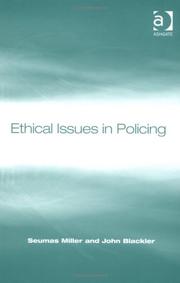| Listing 1 - 10 of 13 | << page >> |
Sort by
|
Book
Year: 2016 Publisher: Oxford : Oxford University Press,
Abstract | Keywords | Export | Availability | Bookmark
 Loading...
Loading...Choose an application
- Reference Manager
- EndNote
- RefWorks (Direct export to RefWorks)
Terrorism, the use of military force in Afghanistan, Iraq and Syria, and the fatal police shootings of unarmed persons have all contributed to renewed interest in the ethics of police and military use of lethal force and its moral justification. In this book, philosopher Seumas Miller analyzes the various moral justifications and moral responsibilities involved in the use of lethal force by police and military combatants, relying on a distinctive normative teleological account of institutional roles. His conception constitutes a novel alternative to prevailing reductive individualist and collectivist accounts. As Miller argues, police and military uses of lethal force are morally justified in part by recourse to fundamental natural moral rights and obligations, especially the right to personal self-defense and the moral obligation to defend the lives of innocent others. Yet the moral justification for police and military use of lethal force is to some extent role-specific. Both police officers and military combatants evidently have an institutionally-based moral duty to put themselves in harm's way to protect others. Under some circumstances, however, police have an institutionally based moral duty to use lethal force to uphold the law; and military combatants have an institutionally based moral duty to use lethal force to win wars. Two key notions in play are joint action and the natural right to self-defense. Miller uses a relational individualist theory of joint actions to construct the notion of multi-layered structures of joint action in order to explicate organizational action. He also provides a novel theory of justifiable killing in self-defense. Over the course of his book, Miller covers a variety of urgent topics, such as police shootings of armed offenders, police shooting of suicide-bombers, targeted killing, autonomous weapons, humanitarian armed intervention, and civilian immunity.
Book
ISBN: 0398086176 9780398086176 9780398086152 039808615X 9780398086169 0398086168 Year: 2011 Publisher: Springfield, Ill. Chares C. Thomas
Abstract | Keywords | Export | Availability | Bookmark
 Loading...
Loading...Choose an application
- Reference Manager
- EndNote
- RefWorks (Direct export to RefWorks)
This third edition has been comprehensively revised, expanding the information in the previous edition on the long-standing challenge of implementing effective, responsible, and acceptable practices in ethical police work. The author's unique perspective provides insights not found elsewhere and presents them in an informative, fact-filled, and encouraging way. The text is based on the premise that ethical crisis has always existed in law enforcement and stresses that policing is and always has been a "morally dangerous occupation." The moral dangers of policing are discussed in detail and emp
Law enforcement -- United States. --- Police ethics -- United States. --- Police ethics --- Law enforcement

ISBN: 0398083525 9780398083526 0398074216 0398074224 Year: 2003 Publisher: Springfield Charles C Thomas Publisher, LTD
Abstract | Keywords | Export | Availability | Bookmark
 Loading...
Loading...Choose an application
- Reference Manager
- EndNote
- RefWorks (Direct export to RefWorks)
Jewish tradition has a great deal to say about morals and ethics in various modern fields of public concern, including police ethics. In Police Ethics and the Jewish Tradition, author Stephen Passamaneck explores three areas of interest: loyalty, bribery and gratuities, and deception. Loyalty will always be a part of police culture and administrators are faced with the task of minimizing its abuses. Jewish tradition encourages the support of the whistleblower who exposes wrongdoing for the sake of the public good. This can sometimes lead to a clash between tradition and the "blue wall of silen
Police ethics. --- Jewish ethics. --- Law enforcement --- Moral and ethical aspects.
Book
ISBN: 163484386X 9781634843867 1634843789 9781634843782 Year: 2016 Publisher: New York
Abstract | Keywords | Export | Availability | Bookmark
 Loading...
Loading...Choose an application
- Reference Manager
- EndNote
- RefWorks (Direct export to RefWorks)
Police ethics. --- Law enforcement --- Police training --- Police --- Police professionalization --- Training --- Enforcement of law --- Criminal justice, Administration of --- Ethics, Police --- Ethics --- Moral and ethical aspects. --- Training of --- Police ethics --- E-books --- Moral and ethical aspects --- Policing

ISBN: 9780387369563 0387369546 0387369562 9780387369549 9786610957613 1280957611 Year: 2006 Publisher: Dordrecht : Springer,
Abstract | Keywords | Export | Availability | Bookmark
 Loading...
Loading...Choose an application
- Reference Manager
- EndNote
- RefWorks (Direct export to RefWorks)
How can we enhance police integrity? The authors surveyed over 3000 police officers from 30 U.S. police departments on how they would respond to typical scenarios where integrity is challenged. They studied three police agencies which scored highly on the integrity scale: Charlotte-Mecklenburg, North Carolina; Charleston, South Carolina; and St. Petersburg, Florida. The authors conclude that enhancing police integrity goes well beyond culling out "bad apple" police officers. Police administrators should focus on four aspects: organizational rulemaking; detecting, investigating and disciplining rule violations; circumscribing the informal "code of silence" that prohibits police from reporting the misconduct of their colleagues; and understanding the influence of public expectations and agency history.
strafrecht --- Criminal law. Criminal procedure --- Criminology. Victimology --- criminologie --- Police ethics --- Police corruption --- Ethics, Police --- Ethics --- Police --- Corruption --- Police misconduct --- Corrupt practices
Book
ISBN: 9781420086706 9781420086720 1420086723 9781466531543 1466531541 1420086707 0429250096 9780429250095 104008253X Year: 2010 Publisher: Boca Raton: CRP,
Abstract | Keywords | Export | Availability | Bookmark
 Loading...
Loading...Choose an application
- Reference Manager
- EndNote
- RefWorks (Direct export to RefWorks)
Increasing concerns about the accountability of criminal justice professionals at all levels has placed a heightened focus on the behavior of those who work in the system. Judges, attorneys, police, and prison employees are all under increased scrutiny from the public and the media. Ethics for Criminal Justice Professionals examines the myriad of ethical issues that confront law enforcement, judicial system, and correctional personnel. Easy to read, practical, and filled with real-life scenarios, this comprehensive volume sheds light on an often complicated and controversial topic. The book be
Criminal justice, Administration of --- Legal ethics --- Police ethics --- Moral and ethical aspects --- Ethics, Police --- Ethics --- Administration of criminal justice --- Justice, Administration of --- Crime --- Criminal law --- Criminals --- Law and legislation --- Criminal justice, Administration of - Moral and ethical aspects - United States --- Legal ethics - United States --- Police ethics - United States
Book
ISBN: 1786350297 9781786350299 1786350300 9781786350305 Year: 2016 Publisher: Emerald Group Publishing Limited
Abstract | Keywords | Export | Availability | Bookmark
 Loading...
Loading...Choose an application
- Reference Manager
- EndNote
- RefWorks (Direct export to RefWorks)
This volume in the series Sociology of crime, law, and deviance edited by Mathieu Deflem addresses contemporary issues of policing with a focus on the characteristics of police power as a coercive force in society and its continued need for legitimacy in a democratic social order. The book brings scholars together to discuss a variety of important topics concerning police and policing. Developments and problems associated with police power are at the very front of current public debate. In the broader constellation of the culture of modern crime control, police institutions enjoy a privileged status. Continued developments in technology and surveillance have affected policing as have continued and new crime problems. Not least of all, of course, the legitimacy of policing has recently been questioned because of several highly-publicized incidents involving police violence. The chapters in this book provide clarification on these and related aspects of police and policing in society. This collection is valuable for students and scholars in sociology, criminology, law, political science, and public policy.
Police ethics. --- Police misconduct. --- Police --- Political aspects. --- Cops --- Gendarmes --- Law enforcement officers --- Officers, Law enforcement --- Officers, Police --- Police forces --- Police officers --- Police service --- Policemen --- Policing --- Ethics, Police --- Legal status, laws, etc. --- Criminal justice, Administration of --- Criminal justice personnel --- Peace officers --- Public safety --- Security systems --- Ethics --- Misconduct in office --- Complaints against --- Police ethics --- Police misconduct --- Political aspects --- E-books --- Police. --- Law enforcement --- Social Science --- Police procedures. --- Criminology.

ISBN: 1282355678 9786612355677 0520910044 9780520910041 0520062868 0520069692 9780520062863 9781282355675 6612355670 Year: 1988 Publisher: Berkeley University of California Press
Abstract | Keywords | Export | Availability | Bookmark
 Loading...
Loading...Choose an application
- Reference Manager
- EndNote
- RefWorks (Direct export to RefWorks)
Providing a rich picture of past and present undercover work, and drawing on unpublished documents and interviews with the FBI and local police, this penetrating study examines the variety of undercover operations and the ethical issues and empirical assumptions raised when the state officially sanctions deception and trickery and allows its agents to participate in crime.
Police patrol --- Criminal investigation --- Undercover operations --- Physical surveillance (Police work) --- Police surveillance (Patrol work) --- Surveillance in police work --- Surveillance operations. --- academic. --- american history. --- crime. --- criminal justice. --- criminal. --- detective work. --- ethical issues. --- ethics. --- fbi. --- fieldwork. --- issues in policing. --- justice system. --- local police. --- morals. --- police brutality. --- police department. --- police ethics. --- police tactics. --- police work. --- research. --- scholarly. --- undercover cop. --- undercover detective. --- undercover investigation. --- undercover police. --- undercover.

ISBN: 1138258318 131525610X 1351939041 9781351939058 135193905X 9781351939041 9780754622444 0754622444 9781315256108 9781351939034 9781138258310 Year: 2005 Publisher: Aldershot: Ashgate,
Abstract | Keywords | Export | Availability | Bookmark
 Loading...
Loading...Choose an application
- Reference Manager
- EndNote
- RefWorks (Direct export to RefWorks)
Police ethics. --- Police discretion. --- Police shootings --- Law enforcement --- Enforcement of law --- Criminal justice, Administration of --- Deadly force used by police --- Police use of deadly force --- Shootings by police --- Use of deadly force by police --- Police patrol --- Suicide by cop --- Discretion, Police --- Administrative discretion --- Ethics, Police --- Ethics --- Moral and ethical aspects. --- Policing --- Police shootings - Moral and ethical aspects. --- Law enforcement - Moral and ethical aspects.
Book
ISBN: 9789046605905 Year: 2013 Volume: 27 Publisher: Antwerpen Apeldoorn Maklu
Abstract | Keywords | Export | Availability | Bookmark
 Loading...
Loading...Choose an application
- Reference Manager
- EndNote
- RefWorks (Direct export to RefWorks)
De relatie tussen mensenrechten en politie wordt steeds belangrijker en actueler. De nadruk wordt in toenemende mate gelegd op de eerbied voor individuele rechten en vrijheden, die we onder meer terugvinden in het Europees Verdrag voor de Rechten van de Mens en in de Grondwet. De politie wordt geacht mensenrechten en fundamentele vrijheden in acht te nemen en wordt daarenboven verzocht die te doen naleven. De politie heeft hierdoor een ambivalente rol. Enerzijds moet zij optreden als facilitator en beschermer van mensenrechten, ook ten aanzien van minderheden en zwakkere groepen in de samenleving. Anderzijds zal zij soms intrusief handelingen moeten stellen vanuit haar gelegitimeerde machtspositie die (uitzonderlijk) deze rechten en vrijheden beperken. Deze grens is allerminst eenvoudig te trekken en de vraag dringt zich op in welke mate de politie in onze samenleving hiermee om kan gaan. Dit Cahier behandelt beide aspecten.
Law of civil servants --- Human rights --- Criminal law. Criminal procedure --- Apparat judiciaire --- Cérémonial judiciaire --- Deontologische code (Rechtsgang) --- Ethics [Police ] --- Etiquette [Legal ] --- Juridische werkwijze --- Legal etiquette --- Police -- Administration --- Police -- Gestion --- Police administration --- Police ethics --- Police management --- Police--Administration --- Police--Gestion --- Politie -- Administratie --- Politie -- Management --- Politie--Administratie --- Politiemanagement --- Rites judiciaires --- Rituel du procès --- Rituel judiciaire --- Civil rights --- Police --- Policiers --- Droits de l'homme --- Practice --- Administration --- Déontologie --- Pratique --- Déontologie --- Political aspects
| Listing 1 - 10 of 13 | << page >> |
Sort by
|

 Search
Search Feedback
Feedback About UniCat
About UniCat  Help
Help News
News